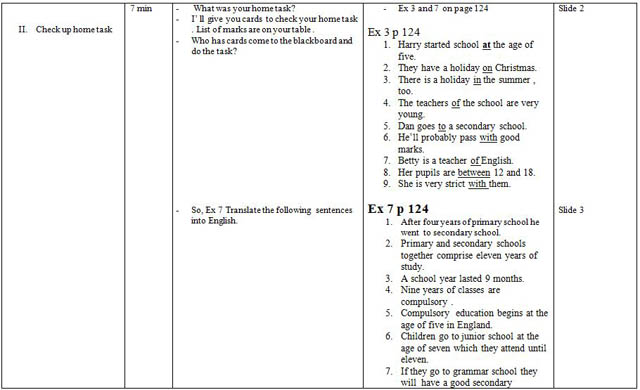Aims of the lesson:
To teach pupils to know a day at school in England; to educate pupils to ethics;
to develop pupils skills and habits in completing the chart, in doing different level task, to fill a diagram, to answer the questions.
Results of learning:
They can answer the questions on the text;
They can use Present Simple Tense;
They can make a dialogue using new words;
The procedure of the lesson.
I. Organization moment:
a. Greeting
b. Divide into groups
- Good morning boys and girls! I am glad to see you and wish you good luck!!!
- Please, my dears come to me.
- Ok. Please divide into two groups. “Polytechnic cycle”(physics, biology, chemistry, maths, ) and “Humanistic cycle”(English, Kazakh, Russian, history, )
- What was your home task?
- I’ ll give you cards to check your home task. List of marks are on your table.
- Who has cards come to the blackboard and do the task?
- So, Ex 7 Translate the following sentences into English.
- Ex 3 and 7 on page 124
Ex 3 p 124
1. Harry started school at the age of five.
2. They have a holiday on Christmas.
3. There is a holiday in the summer, too.
4. The teachers of the school are very young.
5. Dan goes to a secondary school.
6. He’ll probably pass with good marks.
7. Betty is a teacher of English.
8. Her pupils are between 12 and 18.
9. She is very strict with them.
Ex 7 p 124.
1. After four years of primary school he went to secondary school.

2. Primary and secondary schools together comprise eleven years of study.
3. A school year lasted 9 months.
4. Nine years of classes are compulsory.
5. Compulsory education begins at the age of five in England.
6. Children go to junior school at the age of seven which they attend until eleven.
7. If they go to grammar school they will have a good secondary education.
8. English, maths, biology, chemistry are called ‘core’ subjects in England.
9. English pupils have school uniform.
Boys and girls don’t study together at the private school.
III. Brainstorming.
- Ok. Look at the active board. You’ll see a rhyme. Listen to me careful and then repeat after me.
The more we learn, the more we forget,
The more we forget, the less we know,
The less we know, the less we forget,
Why study?
We study at school because …
We go to school because …
IV. Speaking.
- Now, answer the question using these words:
To want to know everything;
To like learning process;
To get good marks;
To one’s success delight parents;
The lesson interesting;
To bring joy to one’s parents;
To want to learn how to solve problems;
To be useful to people;
The teacher was pleased with one’s progress;
To me for one’s successes respected friends;
Весь материал - в документе.

 Получите свидетельство
Получите свидетельство Вход
Вход













 Конспект урока по английскому языку "A day at school" (43.59 КB)
Конспект урока по английскому языку "A day at school" (43.59 КB)
 3
3 3770
3770 1207
1207 Нравится
0
Нравится
0


